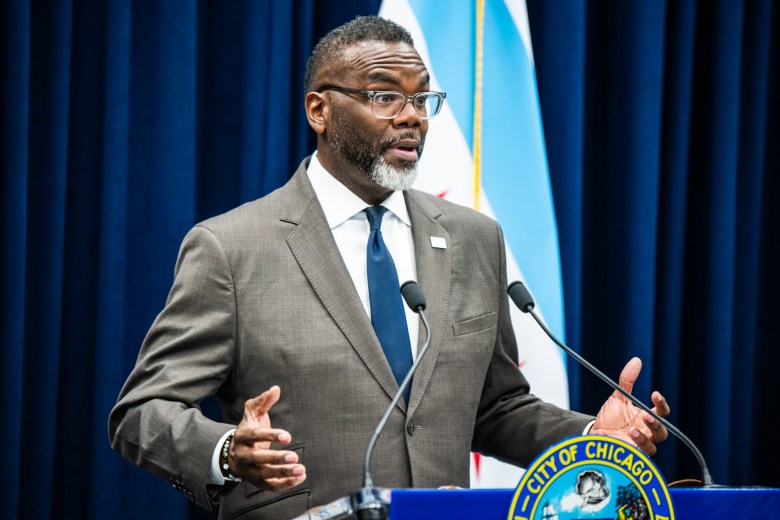Business
Mayor Johnson Allocates City Funds to Combat Food Insecurity

Chicago’s Mayor Brandon Johnson signed an executive order on March 15, 2024, redirecting city funds to food banks and organizations addressing food insecurity. This decision comes in response to recent changes to the Supplemental Nutrition Assistance Program (SNAP) benefits, which have faced significant disruptions following the recent federal government shutdown.
The executive order aims to bolster funding for food assistance programs. Demand for these services reached record levels as SNAP benefits were temporarily halted during the 43-day government shutdown, the longest in United States history. Although SNAP benefits are set to be restored after the government’s reopening, the additional city funding will be crucial when new eligibility requirements take effect on December 1, 2023.
“We cannot accept Chicagoans going hungry as a result of the Trump administration’s war on poor and working people,” Johnson stated in a press release. “This executive order mobilizes City departments and allows us to partner with philanthropic partners to get food into the neighborhoods where it is needed most.”
Approximately 2 million Illinoisans rely on SNAP benefits to purchase groceries and essential items, including baby formula. The federal government paused these payments earlier this month due to the shutdown, leading Illinois to issue partial SNAP payments without federal backing since November 7.
With the government reopening, federal SNAP benefits are expected to resume this month, with recipients in Illinois anticipated to receive their full monthly benefits by Thursday, March 21. Nonetheless, significant changes to SNAP eligibility requirements are looming. These changes, part of President Donald Trump’s “Big Beautiful Bill,” will require recipients aged 18 to 65 to prove they are either working at least 80 hours a month, pursuing education, or engaged in training programs to maintain their benefits. This policy alters previous work requirements that primarily applied to individuals aged 18 to 54 without dependents under the age of 18.
Under the new rules, exemptions will only apply to individuals with dependents under the age of 14, eliminating protections that previously safeguarded unhoused individuals, veterans, and several other vulnerable groups. The anticipated cuts to the federal food assistance program are projected to total $186 billion.
The specific amount of city funding directed towards food assistance efforts through Johnson’s executive order has not been disclosed. However, his office has indicated that the initiative will also provide support to independently owned businesses that have suffered from a decline in SNAP-backed purchases and reduced foot traffic, particularly in immigrant commercial corridors.
Chicago’s restaurants and community organizations have already begun stepping up, offering free meals to those affected by the lack of food assistance. This grassroots effort reflects a commitment from local entities to address food insecurity amid shifting federal policies.
As the situation continues to evolve, the city’s focus on addressing food insecurity underscores the urgent need for accessible assistance in the wake of these federal changes.
-

 Top Stories1 month ago
Top Stories1 month agoNew ‘Star Trek: Voyager’ Game Demo Released, Players Test Limits
-

 World1 month ago
World1 month agoGlobal Air Forces Ranked by Annual Defense Budgets in 2025
-

 World1 month ago
World1 month agoMass Production of F-35 Fighter Jet Drives Down Costs
-

 World1 month ago
World1 month agoElectrification Challenges Demand Advanced Multiphysics Modeling
-

 Science1 month ago
Science1 month agoTime Crystals Revolutionize Quantum Computing Potential
-

 Business1 month ago
Business1 month agoGold Investment Surge: Top Mutual Funds and ETF Alternatives
-

 Entertainment1 month ago
Entertainment1 month agoFreeport Art Gallery Transforms Waste into Creative Masterpieces
-

 Top Stories1 month ago
Top Stories1 month agoDirecTV to Launch AI-Driven Ads with User Likenesses in 2026
-

 Lifestyle1 month ago
Lifestyle1 month agoDiscover Reese Witherspoon’s Chic Dining Room Style for Under $25
-

 Health1 month ago
Health1 month agoGavin Newsom Critiques Trump’s Health and National Guard Plans
-

 Lifestyle1 month ago
Lifestyle1 month agoLia Thomas Honored with ‘Voice of Inspiration’ Award at Dodgers Event
-

 Business1 month ago
Business1 month agoUS Government Denies Coal Lease Bid, Impacting Industry Revival Efforts









